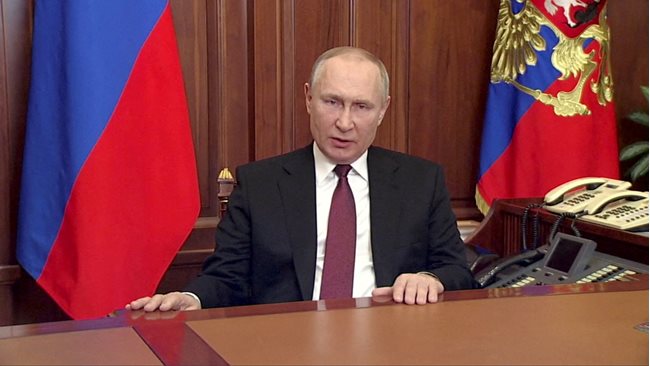–
–
Vladimir Putin Photo: Reuters
–
Putin is no closer to withdrawing troops
David Beasley, Executive Director of the World Food Program: 44 million people worldwide are starving to death
It has been three months since the West began its economic war against Russia and it is not going according to plan.
The effects of sanctions are leading to higher fuel and food costs for the rest of the world and growing fears of a humanitarian catastrophe. Sooner or later an agreement must be reached, writes The Guardian.
The sanctions were imposed on Vladimir Putin, not because they were considered the best option, but because they were better than the other two possible courses of action: do nothing or act with military force.
The first package of economic measures was introduced immediately after the invasion, when Ukraine was expected to capitulate within days. This did not happen, as a result of which sanctions – although still incomplete – were gradually strengthened.
However, there are no immediate signs of Russia’s withdrawal from Ukraine, and this is hardly surprising, as sanctions have had the opposite effect of increasing Russia’s oil and gas exports, significantly boosting the country’s trade balance and funding its military efforts.
In the first four months of 2022, Putin boasts a current account surplus of $ 96 billion (£ 76 billion) – more than three times the same period in 2021.
When the EU announced a partial ban on Russian oil exports earlier this week, the price of crude oil on world markets rose, providing the Kremlin with another unexpected financial income. Russia has no difficulty finding alternative markets for its energy, with oil and gas exports to China increasing by more than 50 percent year-on-year in April.
This does not mean that sanctions are painless for Russia. The International Monetary Fund estimates that the country’s economy will shrink by 8.5% this year as imports from the West collapse. Russia has stocks of goods that are essential to sustaining its economy, but they will be depleted over time.
However, Europe is only gradually shaking off its dependence on Russian energy, thus preventing an immediate financial crisis for Putin. The ruble – thanks to capital controls and a good trade surplus – is strong. The Kremlin has time to find alternative sources of spare parts and components from countries that are ready to circumvent Western sanctions.
When world leaders met in Davos last week, the public message was condemnation of Russian aggression and a renewed commitment to Ukraine’s firm support. Privately, however, there were concerns about the economic costs of a protracted war.
These fears are well-founded. Russia’s invasion of Ukraine has given further impetus to already strong price pressures.
Annual inflation in the United Kingdom is 9% – the highest in 40 years – petrol prices have reached record highs, and in October the energy price ceiling is expected to increase by 700-800 pounds a year.
The latest package of measures to help Rishi Sunak tackle the cost of living crisis is the third by the chancellor in four months – and more later this year.
As a result of the war, Western economies are facing a period of slow or negative growth and rising inflation – a return to stagflation from the 1970s. Central banks – including the Bank of England – believe they need to respond to near-double-digit inflation by raising interest rates.
Unemployment will rise. Other European countries face the same problems, if not bigger ones, as most of them are more dependent on Russian gas than Britain.
The problems facing the world’s poorest countries are of a different nature. For some, the problem is not stagflation, but hunger as a result of blocking wheat supplies from Ukrainian Black Sea ports.
David Beasley, executive director of the World Food Program, said: “Currently, Ukraine’s grain silos are full. At the same time, 44 million people worldwide are starving to death.”
Concerns of a humanitarian catastrophe are growing in all multilateral organizations – the IMF, the World Bank, the World Trade Organization and the United Nations. The position is simple: if developing countries are not energy exporters themselves, they are facing a triple disaster, with fuel and food crises causing financial crises.
Faced with the choice of feeding their populations or paying their international creditors, governments will choose the former. Sri Lanka is the first country after the Russian invasion not to pay its debts, but it is unlikely to be the last. The world seems closer to a full-fledged debt crisis than at any time since the 1990s.
Putin has rightly been condemned for “arming” food, but his willingness to do so should come as no surprise. From the very beginning, the Russian president has been playing a long game, waiting for the international coalition against him to disintegrate. The Kremlin believes that the threshold of economic pain in Russia is higher than in the West, and is probably right in that regard.
The atrocities committed by Russian troops mean that the compromise with the Kremlin is currently difficult to swallow, but the economic reality suggests only one thing: sooner or later a deal will be made.
–

:strip_icc()/i.s3.glbimg.com/v1/AUTH_bc8228b6673f488aa253bbcb03c80ec5/internal_photos/bs/2022/a/A/yH9PjATVmyFgQ74vLhfA/2022-06-06t012809z-155503113-mt1usatoday18467613-rtrmadp-3-nba-finals-boston-celtics-at-golden-state-warriors.jpg)
